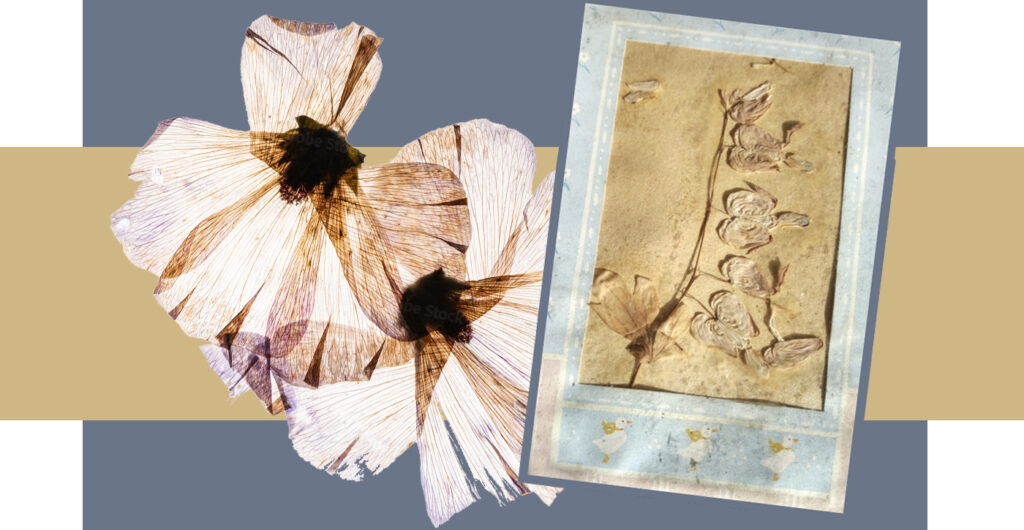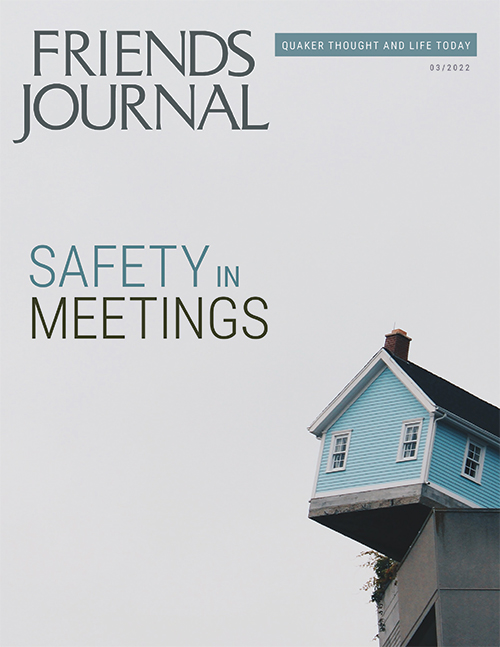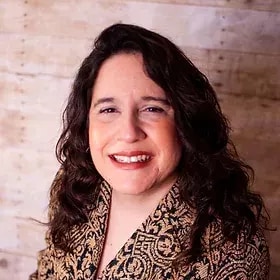Caring for Friends Grieving Perinatal Loss
Attenders of a Quaker memorial meeting gather in silence to recall the connections and contributions of a departed Friend. Those so moved speak out of the silence to share personal stories of the person commemorated. Such memories can comfort the loved ones left behind. When a family suffers a miscarriage or stillbirth, meeting members do not have stories of the departed to share. To support individuals and families coping with perinatal loss, Friends can adapt the usual ways of caring for the bereaved.
The Ministry and Nurture Committee of Birmingham (Ala.) Meeting has supported many bereaved Friends, according to committee clerk Jane Hiles. For example, at the memorial meeting for Hiles’s mother, one Friend shared a remembrance of attending a baseball game with the departed. Another Friend performed a song Hiles’s mother had liked on a recorder. No one has ever come to the committee to ask for support in grieving a perinatal loss. If a congregant asked the committee to help with such a death, Hiles would assure the Friend that they were not grieving alone. “I would try to speak about how much we care about them and how much we want to support them.”
Consulting with Friends mourning a miscarriage or other infant loss to listen to their experience and ask what kind of support they need are the first steps in pastoral care, according to Nancy Johnston, of Lehigh Valley (Pa.) Meeting. Johnston is a retired perinatal loss counselor, certified through the Resolve Through Sharing program of Gundersen Health System in La Crosse, Wisconsin. She is also a retired nurse and professor of nursing. Friends wishing to comfort someone who has suffered a perinatal loss should avoid well-meant but unhelpful comments, such as saying the expectant parent is young and can try again or that God “needed another angel,” Johnston cautioned. Instead, comforters can say how sorry they are for the loss and even admit that they have no words to adequately express their sympathy.
Key to pastoral care is offering deep, uninterrupted attention to enable grieving families to share as they wish.
Key to pastoral care is offering deep, uninterrupted attention to enable grieving families to share as they wish. “A lot of the support would come from just listening to people and their experiences,” said Lauralee Lightwood-Mater, a birth doula who offers succor to people who have suffered miscarriages. Lightwood-Mater is a member of Solebury (Pa.) Meeting. She strongly recommends referring individuals and families to professional perinatal loss counselors and bereavement support groups.
Certified perinatal loss counselors can offer grieving families a variety of options to help them mourn. Miscarriages and stillbirths call for different compassionate responses, according to Johnston. When she suffered a miscarriage in the 1980s, she kept the lab slip confirming the pregnancy because it affirmed the experience of having been pregnant. She also planted a commemorative bleeding heart plant and keeps one of its pressed flowers in a frame.
After Johnston learned that a woman from her meeting had had a miscarriage at an early age, Johnston followed her request to arrange a memorial meeting in which the bereaved mother sat in the center of a small circle of women holding her in the Light and acknowledging that her experience had been excruciating. During the period of silent worship, Johnston believes the woman named the lost baby. For some, naming helps preserve the personhood of the infant who died, Johnston said. The woman also planted a perennial on the meetinghouse grounds to honor the child. The memorial meeting and planting brought the woman peace, according to Johnston.
When Lightwood-Mater had a miscarriage, she chose not to name the being that she lost. The decision to name or not rests with the person grieving and should not be forced. Naming the lost baby can have psychological significance for some bereaved parents. “When you give name to something, it’s letting other people know that you had hopes and dreams for that being,” Lightwood-Mater said. Grieving parents have lost such experiences as watching their child dance in ballet class and playing with their little one at the park, according to Lightwood-Mater.
“If people have chosen to name their lost child, for a lot of people it can be really helpful for parents who have lost a child to hear that name spoken,” Lightwood-Mater said. Including the deceased baby’s name when addressing Christmas cards to the family is an example of how to comfort the surviving relatives by acknowledging their departed child, suggested Lightwood-Mater.
To commemorate a stillbirth, a perinatal loss counselor can suggest a different set of options. For example, one family had a stillborn baby buried in a layer of soil on top of the grave of a predeceased relative. “It was symbolic that this older ancestor was holding the baby,” Johnston said.
One hospital chaplain brought to a memorial gathering a seashell to collect the family’s tears with which to anoint the stillborn baby. The family kept the seashell. Nurses sensitively photographed one stillborn baby, allowing the mother to visualize her lost child as she grieved. Parents can also find it healing to wash their stillborn babies because they draw reassurance from having comforted their little ones. One mother grieving perinatal loss pumped and donated her breast milk. Johnston noted that female volunteers knit and crochet hats and shawls for people grieving a stillbirth to use to dress their babies. Another bereft mother kept a box with her positive pregnancy test along with the baby’s photo.
Loss counselors not only support parents but also siblings who often have not dealt with any other death in the family. Before Johnston’s miscarriage, her son had announced to the extended family at Thanksgiving that he was going to be a big brother. While Johnston accompanied a family coping with a stillbirth, she encountered an unanswerable spiritual question from a sibling. “The five-year-old sister asked me, ‘Why would God make a baby if it’s not going to be perfect?’” Johnston said.
Those mourning the loss of a baby go through stages of grief just as those responding to the passing of an adult relative do. Initially, mourners experience shock and numbness. Subsequent stages include searching and yearning, disorientation, and reformation of self, Johnston said. Perinatal loss counselors enable bereaved relatives to acknowledge their departed baby as well as their own emotions. “The job becomes giving families permission to say hello before they have to say goodbye forever,” Johnston said.

Framed pressed blooms of the bleeding heart commemorative flower that Nancy Johnston planted to honor the baby she lost through miscarriage in the 1980s.
In addition to helping mourners with their emotional and spiritual needs, Friends can offer practical support, such as arranging to have home-cooked meals delivered to them, Lightwood-Mater said. A member of Lehigh Valley Meeting came to visit Johnston after the miscarriage, told her to sit down, then washed Johnston’s dishes, which Johnston took as a demonstration of unconditional love.
Friends offering support during perinatal loss should be cognizant of varying practical circumstances in families. Any couple or person who has used costly in vitro fertilization (IVF) has an added layer of concern after miscarriage; this is often true for those who identify as lesbian, gay, bisexual, transgender, or queer. “For some LGBTQIA parents, pregnancy can be not only physically and emotionally demanding but also very financially demanding,” Lightwood-Mater said. Trying IVF again after a miscarriage could be cost-prohibitive, she said.
Johnston suggested that Friends who want to help individuals and families coping with perinatal loss could offer to hold a clearness committee with the bereaved to determine what kind of support would most help them. Faith and Practice books should offer advice on convening memorial meetings for individuals and families suffering perinatal loss, Johnston said. Some Quakers coping with perinatal loss might commemorate the departed in the manner of Friends with the memorial meeting consisting exclusively of relatives, or they might invite the whole meeting.
Some people grieve perinatal loss openly for a long time, but others need a lot of privacy, Lightwood-Mater said. Participants in memorial meetings should be open to Spirit and be especially careful to avoid entering worship with prepared comments in mind. “Hopefully any messages that are received and shared out loud are coming from the outward places,” Lightwood-Mater said, referring to spiritually inspired messages offered during memorial meetings.
Communal acknowledgement of grief can help survivors heal. “It needs to be not ignored, not swept under the carpet.”
In addition to participating in a memorial meeting, Friends can help those suffering perinatal loss by drafting a commemorative minute, said Wendy Kane, Bucks Quarter (Pa.) coordinator and member of Newtown (Pa.) Meeting. Paul Kester, of Newtown Meeting, in a minute commemorating a stillborn baby wrote:
We have nothing to say about the when, where, or by whose act of love we come into being. And we have little to say about the when and how of our dying. We are persuaded, however, that every life is precious and has meaning and purpose in God’s creation.
Several Friends contacted for this article said their meetings had never been asked to respond to someone grieving a perinatal loss. The End of Life Committee at Celo (N.C.) Meeting plans to add to their documents a description of how the committee can support members and attenders grieving miscarriages or stillbirths, said Anne Maren-Hogan, co-clerk of the committee. Donna Idol serves as the other co-clerk.
Previous generations considered perinatal loss a taboo subject, but people have become increasingly open to talking about it, Lightwood-Mater said. Such candor and communal acknowledgement of grief can help survivors heal. “It needs to be not ignored, not swept under the carpet,” Kane said.






Albert schwetsers etnitcs are guiding for me, I am life that’s wants to live, in the midst of life that wants to live.
I just read the article regarding Prenatal Loss written by Sharlee DiMenichi and it was very good. “Those mourning the loss of a baby go through stages of grief just as those responding to the passing of an adult relative do. Initially, mourners experience shock and numbness.”
That definitely brings back memories for me when I worked at the hospital on the maternity ward where I provided newborn photos. I remember a few years ago when the head nurse asked if I would be able to photograph a still birth for the parent’s grieving. I said I would and she brought me into their room to offer it to them and they declined but I will never forget the feeling of complete shock and numbness when I entered their hospital room. Very sad and I must say I was a little relieved when they declined but I would have done the photo session if they had wanted me to.